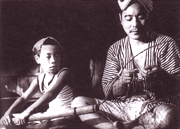The first of Yasujiro Ozu’s Kihachi ‘Everyman’ pictures after Takeshi Sakamoto’s recurring role as the stubborn and uneducated, but goodhearted rogue, Passing Fancy is a thoughtful, humorous, and accessible domestic portrait of family, community, and everyday life in the poor, working class suburbs of Tokyo (a social milieu that Ozu would return to in other Kihachi films such as The Story of Floating Weeds and An Inn in Tokyo, and also in Record of a Tenement Gentleman). The opening sequence of live entertainment at the local town hall comically illustrates the carefree existence, but seemingly inescapable poverty that surrounds Kihachi and his sharp-witted, but undisciplined son Tomio (Tomio Aoki): an inadvertently misplaced, empty wallet works its way around the room as each presumptuous finder retrieves, checks for content, then discards the object before Kihachi exchanges the larger wallet with his own, smaller one, initiating a new chain of ill-intentioned finders as Kihachi’s wallet inevitably makes it way back to the original site of the lost item. Chronicling the quotidian of Kihachi’s daily life as he alternately tries to dodge the responsibilities of work, win the affections of an out-of-work young woman named Harue (Nobuko Fushimi) who has been taken in by his widowed neighbor Otomo (Choko Lida), and teach his far more learned and responsible son important life lessons, Ozu’s portrait of the working class is affectionately rooted in the inviolable bonds between parent and child and the collective strength of human community.
© Acquarello 2005. All rights reserved.
